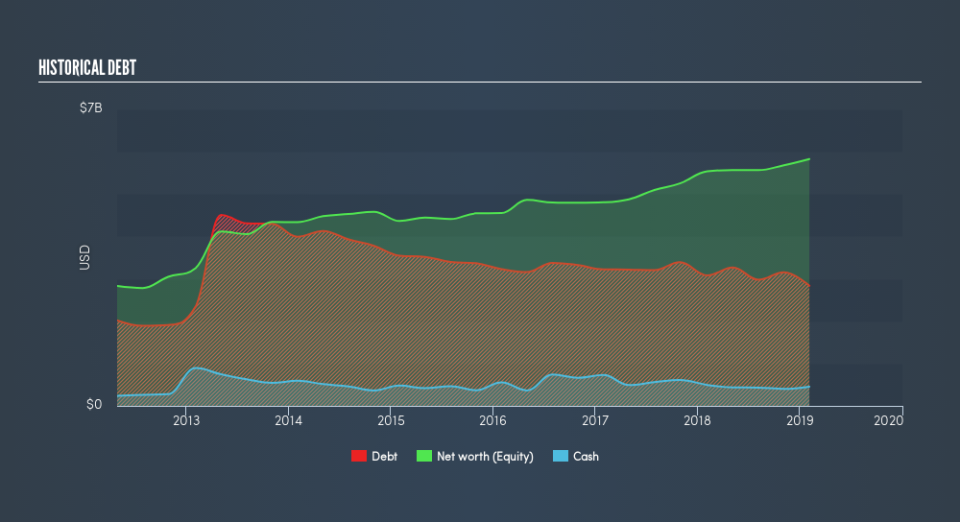What does PVH Corp.'s (NYSE:PVH) Balance Sheet Tell Us About Its Future?

PVH Corp. (NYSE:PVH), a large-cap worth US$9.8b, comes to mind for investors seeking a strong and reliable stock investment. Big corporations are much sought after by risk-averse investors who find diversified revenue streams and strong capital returns attractive. But, its financial health remains the key to continued success. I will provide an overview of PVH’s financial liquidity and leverage to give you an idea of PVH’s position to take advantage of potential acquisitions or comfortably endure future downturns. Note that this information is centred entirely on financial health and is a high-level overview, so I encourage you to look further into PVH here.
See our latest analysis for PVH
PVH’s Debt (And Cash Flows)
Over the past year, PVH has reduced its debt from US$3.1b to US$2.8b , which includes long-term debt. With this reduction in debt, PVH's cash and short-term investments stands at US$453m , ready to be used for running the business. On top of this, PVH has generated US$853m in operating cash flow during the same period of time, resulting in an operating cash to total debt ratio of 30%, meaning that PVH’s operating cash is sufficient to cover its debt.
Can PVH meet its short-term obligations with the cash in hand?
With current liabilities at US$1.9b, the company has been able to meet these obligations given the level of current assets of US$3.2b, with a current ratio of 1.71x. The current ratio is the number you get when you divide current assets by current liabilities. Generally, for Luxury companies, this is a reasonable ratio since there is a bit of a cash buffer without leaving too much capital in a low-return environment.
Is PVH’s debt level acceptable?
With debt reaching 49% of equity, PVH may be thought of as relatively highly levered. This is not unusual for large-caps since debt tends to be less expensive than equity because interest payments are tax deductible. Accordingly, large companies often have an advantage over small-caps through lower cost of capital due to cheaper financing. No matter how high the company’s debt, if it can easily cover the interest payments, it’s considered to be efficient with its use of excess leverage. A company generating earnings after interest and tax at least three times its net interest payments is considered financially sound. For PVH, the ratio of 7.93x suggests that interest is well-covered. Large-cap investments like PVH are often believed to be a safe investment due to their ability to pump out ample earnings multiple times its interest payments.
Next Steps:
Although PVH’s debt level is towards the higher end of the spectrum, its cash flow coverage seems adequate to meet obligations which means its debt is being efficiently utilised. Since there is also no concerns around PVH's liquidity needs, this may be its optimal capital structure for the time being. I admit this is a fairly basic analysis for PVH's financial health. Other important fundamentals need to be considered alongside. I recommend you continue to research PVH to get a more holistic view of the large-cap by looking at:
Future Outlook: What are well-informed industry analysts predicting for PVH’s future growth? Take a look at our free research report of analyst consensus for PVH’s outlook.
Valuation: What is PVH worth today? Is the stock undervalued, even when its growth outlook is factored into its intrinsic value? The intrinsic value infographic in our free research report helps visualize whether PVH is currently mispriced by the market.
Other High-Performing Stocks: Are there other stocks that provide better prospects with proven track records? Explore our free list of these great stocks here.
We aim to bring you long-term focused research analysis driven by fundamental data. Note that our analysis may not factor in the latest price-sensitive company announcements or qualitative material.
If you spot an error that warrants correction, please contact the editor at editorial-team@simplywallst.com. This article by Simply Wall St is general in nature. It does not constitute a recommendation to buy or sell any stock, and does not take account of your objectives, or your financial situation. Simply Wall St has no position in the stocks mentioned. Thank you for reading.

 Yahoo Movies
Yahoo Movies 

